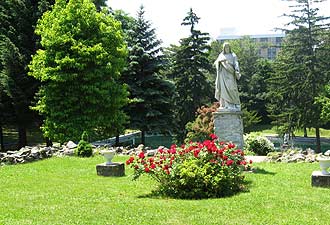
we are now continuing
our biblical exploration,
always in this theme of water.
water that gushes out from Jesus’ side.
So today we have simply
referred to a very, very well-known
passage from the Old Testament
that we know well.
It is about exodus,
chapter 17 the water which gushes out of the rock.
So you can see
that there is already quite a symbolism there.
What is it about ?
The people, under the leadership of Moses, are in the desert,
the people murmur and revolt
because there is no water to drink.
And so he blames Moses,
he says, “Is it
to kill us in this wilderness
that you brought us here?”
And then Moses cries out
to God and God tells him.
“Go ahead.
Take your staff.
The staff with which
you have already performed miracles:
you parted the sea,
you struck the waters of the Nile etc.
And go on the rock over
there, in Horeb.”
Remember that:
“and I say God,
I will stand before you,
on the rock”. As if
there was a presence of God
and there you will strike the rock
and the people will be able to drink.
But if we look
very precisely, of course,
we are inspired here by what we know
from what follows, by the New Testament,
by Jesus who died on the cross …
But it is as if God,
behind the scenes, was saying
to Moses knock on me
and I will give water
because he says, “I will be present
on the rock” and knock on the rock
there is almost an identification,
between God and the rock.
Especially since the rock
is a symbol of God.
In the Old Testament,
we say of God that he
is “the rock of Israel”
precisely because he evokes
something stable, securing
an unshakeable foundation.
And so we can rightly
say that Jesus
is our true rock.
And so then,
when Moses
strikes the rock,
water actually gushes out abundantly and finally
the pilgrims of the promised land
on their way to the promised land
can drink.
And, from a symbolic point of view,
it is the same thing, the water
which gushes out of this rock, that
is Jesus … well, gives us life
through the sacraments,
through baptism, through ‘Holy Spirit
constantly given. And quenches our thirst,
gives us the strength
to continue our long pilgrimage
to the promised land.
But this promised land towards
which we are going is no longer
geographic at all .
It is a spiritual promised land,
it is Celestial Jerusalem,
it is paradise,
It is the city, the city
which will know no end
and in which we will be
fully in joy.
So see how important
this passage is.
Now, what I am telling you there,
it is not only the Tradition of the Church
03:13
that says it, or the Fathers of the Church.
There is already a commentary made
on this passage in the New Testament.
If you look,
maybe you don’t have time
now to open your Bibles,
but it’s the 10th chapter
of the first letter to the Corinthians,
the very first verses,
and I’m reading it to you.
This means that Saint Paul
makes an analogy
between the great events of the exodus,
of the people in the desert
and the sacraments,
so listen carefully: “for I do not want
you to ignore it brothers,
our fathers were all under the cloud,
all passed through the sea … “
and now this is what he says:
” All were baptized in Moses,
in the cloud and in the sea. “
It means that they
were immersed in the cloud
and in the sea.
Of course, it is not a Christian baptism,
but they were baptized
because he was immersed in this
presence of God, the cloud.
And then in the sea. “All ate
the same spiritual food”
that we know well:
it is manna.
And that announces
the Eucharist.
We too
are eating spiritual food,
“and all,” and that’s
what is important to all of us,
“have drunk the same spiritual brew.”
“They were indeed drinking
from a spiritual rock
that accompanied them and that rock
was Christ.”
This is what Saint Paul says.
So obviously, it was not
the substantial Christ, but this rock,
already symbolized Christ,
what was going to be
Christ for us
see therefore, remember well
first letter to the Corinthians, chapter 10,
verses 1 to 4 See you
tomorrow, Dear brothers and sisters.
Source: Fr Kars